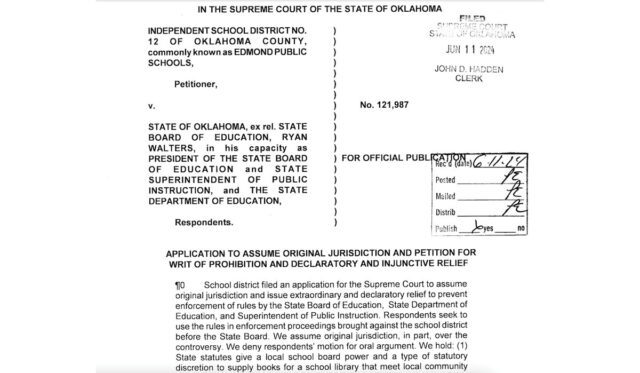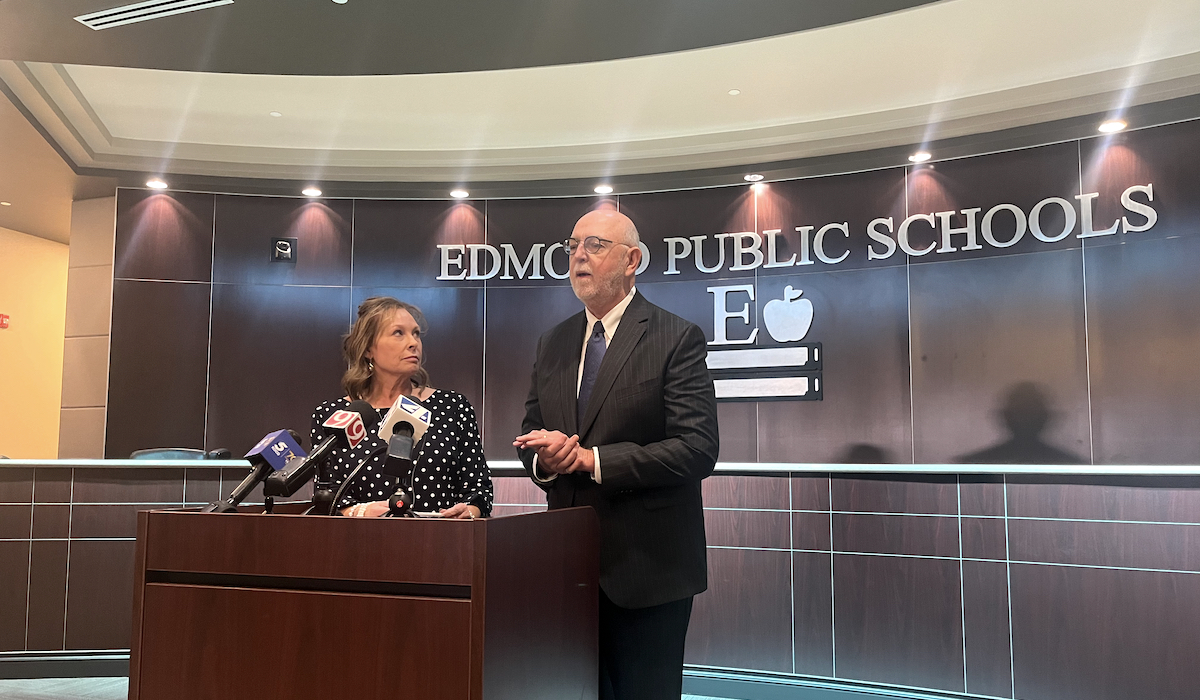

With all justices concurring, the Oklahoma Supreme Court issued a narrow ruling Tuesday siding with Edmond Public Schools over State Superintendent of Public Instruction Ryan Walters, the Department of Education and State Board of Education regarding what body has authority to regulate books in a school district’s library. The opinion called the respondents’ arguments “not persuasive.”
In assuming original jurisdiction and issuing the opinion, justices granted EPS’ request for a writ of prohibition preventing the State Board of Education from carrying out proceedings against the district regarding its refusal to remove two books from its libraries. OSDE sent a letter to EPS on Jan. 19 ordering the district to remove The Glass Castle by Jeannette Walls and The Kite Runner by Khaled Hosseini from its high school libraries. Both books are popular across the country in high school English classes, but each has drawn criticism for depictions of sexual assault and rape.
OSDE had based its authority for the order on new rules the State Board of Education promulgated last year banning sexually explicit materials in school libraries.
Justice James Edmondson wrote the opinion for the court.
“We conclude a local school board possesses statutory authority to maintain and control its local school library, and one aspect of this control includes discretionary selection for providing supplemental educational books and instructional material deemed appropriate by the local school board in compliance with state statutes,” wrote Edmondson. “No statute gives the State Board of Education, State Department of Education, and Superintendent of Public Instruction the authority to overrule a local school board’s exercise of discretion in applying its local community standards for books in a local school library.”
Edmond Public Schools officials celebrated the court’s decision in the case, which was being watched and supported by school districts around the state.
“We are grateful for today’s decision from the Oklahoma Supreme Court. We appreciate their willingness to take the case and their decision,” said Jeff Bardach, the EPS public information officer. “Today’s decision protects our locally elected school board’s role in creating policies that determine how library materials are selected and reviewed.”
In a statement, Walters said he was “disappointed” by the decision, but said it “was made on very narrow grounds.”
“The court did not sign on to any of the claims made by the districts that would have affected the State Board of Education’s broad authority over school districts or the governor’s ability to approve our administrative rules,” Walters said. “My message to Oklahoma parents is clear: We will get porn out of schools. We will not allow a woke mob to dictate what our kids are exposed to. The Legislature must act and reign out of control access to pornography in schools that our kids are exposed to. Ambiguity and indecision are never acceptable. I will be exploring all available tools to act.”
House Appropriations and Budget Education Subcommittee Chairman Mark McBride (R-Moore) chided Walters in a statement.
“This is what happens when you don’t take the advice of an attorney general opinion. You waste taxpayer dollars just to show that local control prevails,” McBride said.
Justices note AG opinion

Andy Fugitt, the school district’s legal counsel, speak to reporters at a press conference on Tuesday, Feb. 20, 2024. (Joe Tomlinson)
The opinion released Tuesday functionally invalidates the State Board of Education rule on library books approved last year, but justices appeared to stop short of making a more extensive ruling about what statutory authorization is necessary for all state agency rules.
Oklahoma State Board of Education members approved the new accreditation standards concerning libraries at a meeting March 23, 2023, although it was immediately unclear if the standards could be enforced owing to an attorney general opinion released the next month.
As passed, the standards attempted to require school districts to submit their catalog of library books to OSDE each year. According to the language of the standards, if the State Board of Education found that a school district housed library books violating the prohibition on “pornographic” or “sexualized content,” the board “shall alter the accreditation status of the school district at issue to either Accredited with Warning or Accredited with Probation.”
Attorneys for EPS had relied on an opinion issued by Attorney General Gentner Drummond in April 2023 declaring Walters’ and the board’s rules invalid because they had not received a specific directive from the Legislature to promulgate those rules.
But even though Supreme Court justices seemed to agree with some of the arguments in the AG opinion, they declined to opine on “the legal correctness, scope or effect” of Drummond’s official opinion because their ruling Tuesday affirming local control of libraries effectively resolved the issue.
“Although with the exception of an attorney general’s opinion that an act of the Legislature is unconstitutional, an attorney general’s opinion is usually binding upon the state officials whom it affects, and public officers have the duty to follow attorney general opinions until they are judicially relieved of compliance,” Edmondson wrote. “Respondents appear to recognize that [Drummond’s opinion] conflicts with respondents’ rules due to their request for the court to hold [the opinion] as legally incorrect.”
Edmondson also said Oklahoma’s education system is set up to maximize local control.
“The state board appears to argue that its general supervisory role in education matters is itself sufficient authority for the state board to ‘supervise’ any discretionary decision statutorily given to a local school board with a proceeding before the state board to examine and correct the local school board’s decision in an enforcement proceeding,” Edmondson said. “We disagree.”
(Update: This article was updated at 7:20 p.m. Tuesday, June 11, to include a statement from McBride.)




















